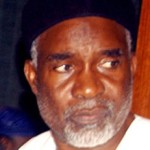The Collapse of NLC Strike
Articles/Opinion, Featured, Latest Headlines Tuesday, May 24th, 2016
By Prof R. A. Ipinyomi, University of Ilorin, Nigeria
On Sunday May 22, 2016 the comrade Ayuba Wabba-led faction of the Nigerial Labour Congress, NLC, announced that it had called of its nationwide strike against the increase in pump price of petroleum products and hike in electricity tariff. They had embarked on the strike since Wednesday 18 May. The strike lasted just 3 working days and only a few of their umbrella associates had joined in the strike which included some branches of ASUU and SANUU. As it turned out, the strike can be called any name such as abortive compared to similar ones in recent times. For example, on January 1, 2012, hell broke loose as NLC and all its associates went on a strike that resulted in loss of lives and close down of government offices across the nation. It was a big nightmare for the Jonathan administration, and an opportunity for the opposition to launch an unending campaign that we believe gave a foundation to the present ruling party, the APC of president Buhari. What has changed in the country?
The NLC had come out of a national strike this time as if giving out a huge reward to resentment and anger more than the mastery of prevailing economic market and public institutional failure. This may not be an accurate critique of a movement that once claimed to have all the new ideas and interest of the welfare of the less privileged. But they failed to understand the concept of change and what should be changed. They fail to understand their own roles, as not mere idle workers running down public institutions, but preferring to blame others. They fail to understand how to have a breakthrough within the pile of economic mess placed on them by the cabalism of their leadership but appearing to be comfortable with giving public money to systemic corruption in the subsidy fuel market. They also fail to understand and grapple with a positive change. Workers are more interested in changing their circumstances rather than in changing their working environment and attitudes to work. Sometimes when we change, our circumstances may change as a natural result and we can key into that, even if those changes are painful. If we change wrongly the result is failure.
The most glaring aspect of the collective failure lays itself bare in our inability to know that we have reached the end of big petrol dollar economy. At present this is the less visible scenario of the whole matter and whilst vandals in Delta region are still of the opinion that they matter. They won’t matter for long but they may only ruin their regional infrastructure and commonwealth. The best option for them is to defend the infrastructural monuments the passing oil glory may be leaving in that region rather than destroying them. Protect yourself and your region rather than destruction of the installations or anialating foreigners away from your communities. The end of petrol dollar economy may be still a few months ahead but we have seen it’s signs. For example oil prices have just hit some 7-year low recently and still sliding. It could fall continuously and to $15 per barrel by early 2017 or below simply because, apart from the excessive available of the commodity, cheaper alternatives of fueling and energy sources are becoming visible and plausible sooner than later. Nigeria may improve on its refineries only to be self sufficient and to dominate the economy in our subregion. Big exportation days may be over.
The NLC’s main insight says President Buhari is wrong about everything but this is another level of disconnection from prevailing reality. The truth is that every thesis creates its antithesis, every argument brings up a set of alternatives and every time you propose a change the alternatives to change are many. Hence the NLC may have underestimated the factor of a Buhari and played the strike game as if nothing has changed. Buhari has changed many things and we all have to run our individual catch up programs in order to be economically relevant. The president is not so fantastically corrupt but the system still is, and the NLC is still fantastically in the old school where strikes are sponsored by oil marketers, the mafia and the cabal, and opposing interest groups. Hence a major factor why the strike could not gather it’s usually momentum was the incoming of a Buhari effect in the national body polity. He is not publicly seen to be involved or concerned either in the various investigations ongoing or in the abortive strike yet his military tactics of surprise moves are visible.
I met a mechanic on Friday whilst the strike was still on. He came and asked, “sir please no ves o because of my question”. I replied, “please ask your question”. Thanks he said, “I know you be ASUU man, why are you people going on strike?” He asked many other questions but he thought I could be offended by them or that he would not be asking the right questions. I told him I was on the same page with him. Then he responded, “this is why I no want talk to professor, what do you mean, on the same page?”
That is, the roadside mechanics knew the public policy decision on subsidy didn’t call for a strike for ASUU. Meanwhile some part of the press is full of negative articles and opinions on why ASUU joined the strike. These people are supposed to know better. At first I had thought that the negative articles and opinions about ASUU were from university drop outs, parents who couldn’t secure admissions for their wards or others that have been victims of the tertiary institutions. On the contrary it is not so. Strike action has been over flogged and over used. We have never got the right weapon to fight the different wars correctly hence we always lose. If there would be anything to gain from this unfortunate episode, where we have unpaid wages across the nation, the minimum wage is too minimum, petrol price going up 68% overnight and nobody should talk, the refineries are down and out of date, vandals are destroying the system daily, a few Nigerians are milking on the so called subsidy, we need to pocket our pride and begin the job of nation building from start.
Prof R. A. Ipinyomi
Related Posts
Short URL: https://www.africanexaminer.com/?p=32936






















